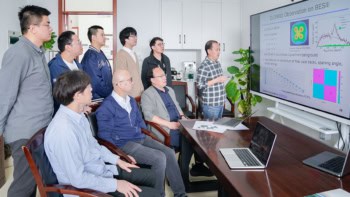
The physicist Claudia Sheinbaum Pardo has been elected president of Mexico following a landslide victory on 2 June. She gained more than twice as many votes as her nearest opponent, the computer engineer Xóchitl Gálvez Ruiz. When she takes up office on 1 October, Sheinbaum Pardo will become Mexico’s first female president.
Sheinbaum Pardo, 61, was born on 24 June 1962 and both of her parents were scientists. Her mother, Annie Pardo Cemo, is a biochemist while her father, Carlos Sheinbaum Yoselevitz, is a chemical engineer.
Both she and her brother, Alex, followed their parents into science and became physicists. Sheinbaum Pardo earned a physics degree from the National Autonomous University of Mexico (UNAM) in 1989 before carrying out a PhD in energy engineering at UNAM.
Her PhD research, which focused on energy consumption in Mexico and other countries, was mostly carried out at the Lawrence Berkeley National Laboratory in the US. After graduating in 1995, Sheinbaum Pardo joined UNAM’s Institute for Engineering where she worked on the transition to renewable energy sources.
From science to politics
Sheinbaum Pardo’s political activities began during her undergraduate years at UNAM. In the early 1990s she joined a protest about the university’s tuition fees and later helped set up the left-wing National Regeneration Movement (Morena) party in 2011.
When Andrés Manuel López Obrador became mayor of Mexico City in 2000, he selected Sheinbaum Pardo as environment secretary. The pair remained politically close, but when López Obrador lost the 2006 presidential election, she returned to UNAM as a researcher.
Sheinbaum Pardo co-authored sections of the United Nations Intergovernmental Panel on Climate Change (IPCC) fourth assessment report, which warned that the warming of the climate is “unequivocal”. For their work on climate change, the 2000 members of the IPCC shared half the 2007 Nobel Peace Prize with former US vice-president Al Gore.
When López Obrador finally won Mexico’s presidency in 2018, following another failed attempt in 2012, Sheinbaum was elected mayor of Mexico City by a landslide. In that role, she did a lot for the environment, including electrifying the metropolis’s bus fleet, starting construction of a photovoltaic plant to cut emissions of carbon dioxide and boosting the conurbation’s bicycle lanes.
While López Obrador largely favoured the country’s oil industry and cut science funding during his six years in office, Sheinbaum Pardo has said that she intends to focus on renewable energy technologies and “to make Mexico a scientific and innovation power”.
Yet Mexico’s scientific community questions whether she will be able to achieve this. Some political commentators have expressed doubts that she will be able to escape the shadow of her mentor and govern in her own style.



